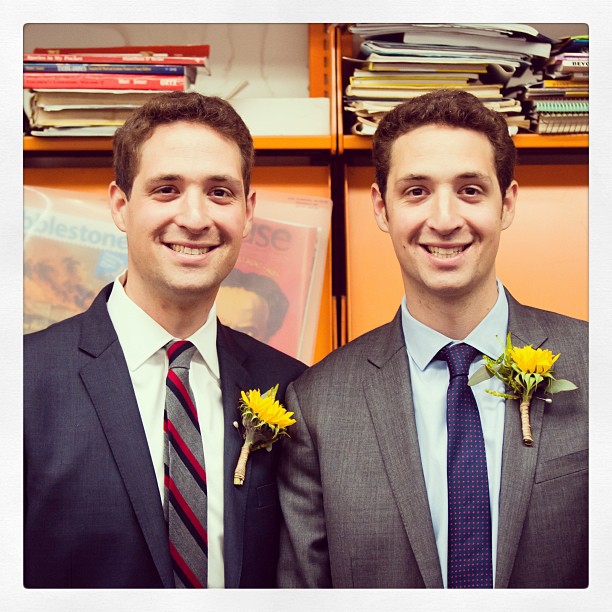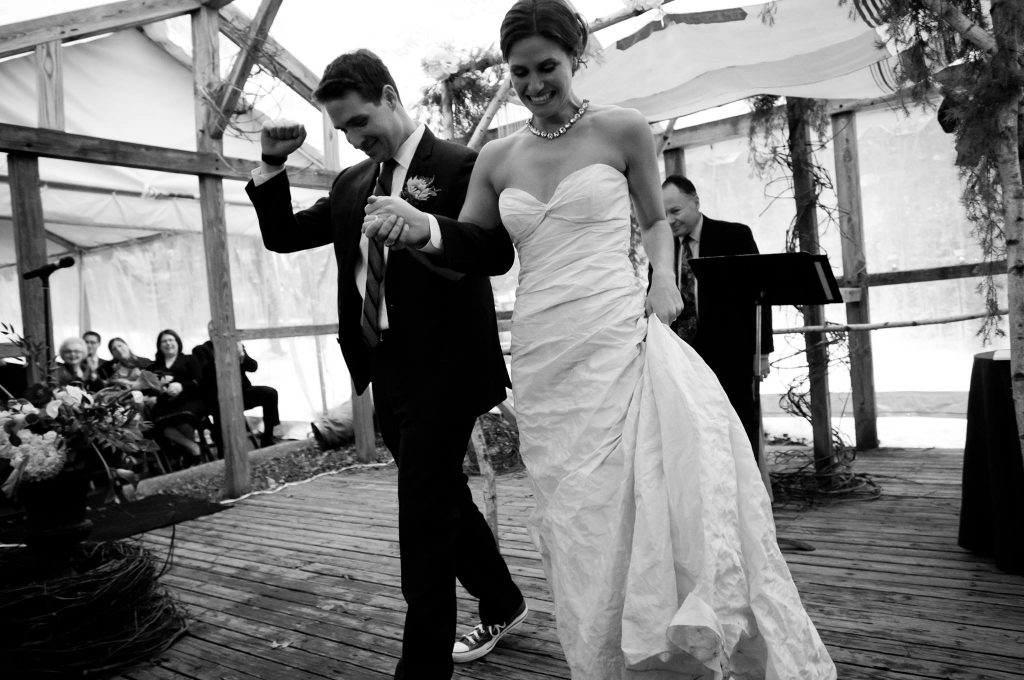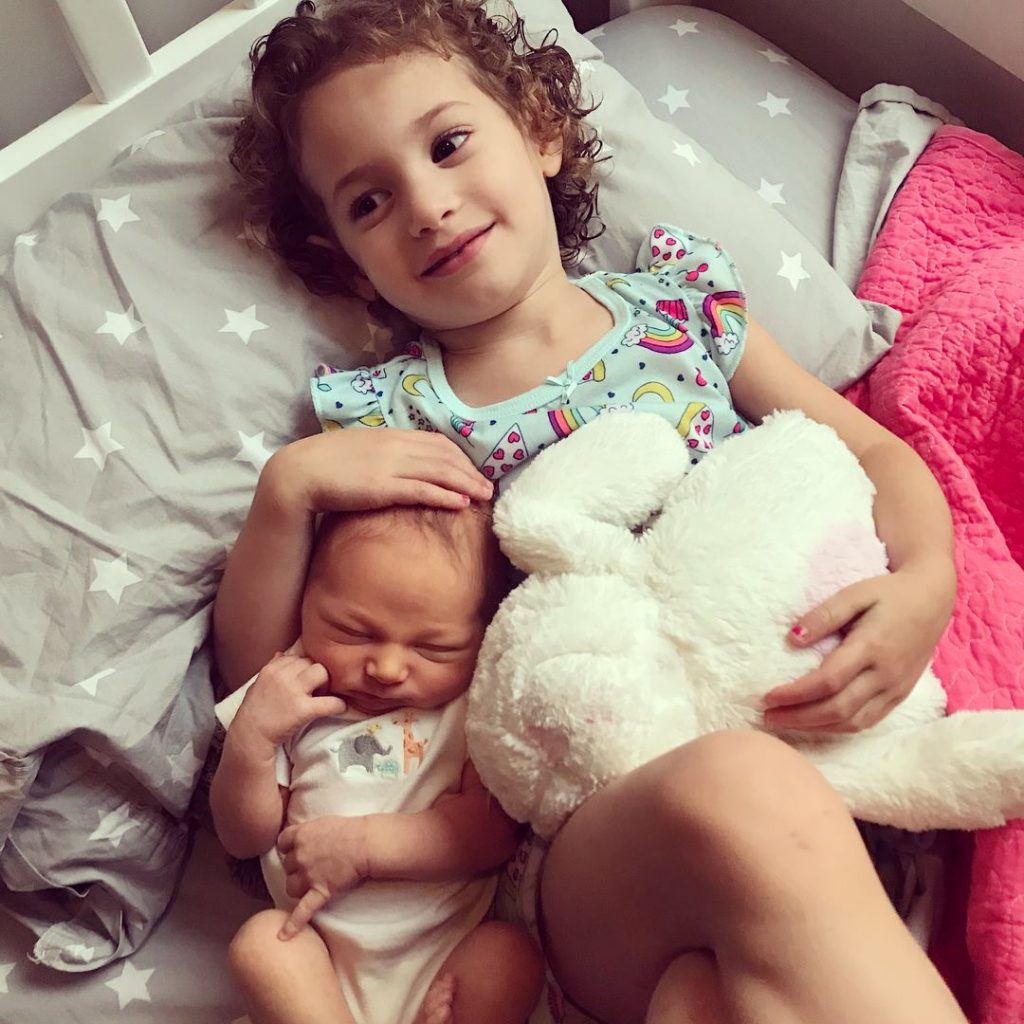Unconventionally Conventional
Peter Slutsky ’93 revisits his early years, growing and learning at The Miquon School
Peter Slutsky started Kindergarten with several distinct advantages: Number one was that his parents had sent his sister, Carolyn, to The Miquon School. Three years older than Peter and his twin, Matthew, she paved the way, so the boys knew what to expect.
Even so, every day was a revelation for the youngster, now 37 and a resident of Center City, Philadelphia, with his wife, Laura, their 4-year-old daughter, Zoey, and newborn son, Jacob.
“I remember the koi pond and how we used to feed the fish,” says Slutsky. “I remember learning music and instruments and singing with other students … putting on performances. And I remember exploring the woods and baking apple pie.”
Baking apple pie? In a kindergarten? Well, technically, in first grade.
“We did a lot of practical arts, and I remember being outside playing in first grade and the teacher called us to come in because the pies were ready,” says Slutsky. “I ran and fell and broke my arm. I remember it as clear as day—it was my first schoolyard injury. But when I tell people that story, all they want to know is why we were baking in the classroom!
“Things like baking and playing in the creek, building dams and finding cray fish. . . all were learning. My parents really valued that and I value that when I think of my kids and what I want them to be exposed to in their education.”
Slutsky talks easily about the community as a whole, calling the teachers “amazing and great” parts of a close-knit community. “Every day, [as a student there] you are nurtured by the entire community, all day, every day.”
As complete as his memory is, Slutsky knows that his Kindergarten teacher, Cynthia Adams, was able to recall memories about each student that “blew his mind” when he met her again years later, saying she remembered things he didn’t about his experience.
Slutsky recalls his Miquon School experience as “unconventionally conventional.”
By this, Slutsky means that all the milestones of learning are met–but the way he and other students reached those milestones was completely different from what one would find at a more conventional school.
Perhaps unknown to him at the time, Slutsky’s memories of hands-on activities like baking apple pie and building dams and collecting crayfish in the Miquon creek imparted important, real-world lessons in weights and measures, physics, and biology–lessons that were carefully supported and reinforced by Miquon teachers with classroom work.
As a result, there was a lot of interest in the projects happening, and students were rarely intimidated. “You never felt the pressure of learning, never felt like you were being judged against other kids,” Slutsky adds-noting that when you look at each graduating class, you will see students who have gone on to the best schools in Philadelphia and the best colleges.

Post-graduation
After graduating from Miquon, Slutsky (whose family had moved away from Mt. Airy) went on to attend Lower Merion schools, which was a big change for him, starting with the class size, from a graduating class of 17, he went on to Bala Cynwyd Middle School with a class of about 200. “It took a long time to figure out my cadence and my needs, and there was support, but not the one-on-one support I had been used to. It wasn’t Miquon,” he says.
Slutsky mentions some paperwork his parents recently gave him, reports that were written by teachers at Miquon. Far from the standardized report cards found in many schools, with little boxes for letters or checks that gauge a student’s academic progress, these Miquon reports were long narratives about him as a person as well as a student. “. . . about the social person I was becoming,” he says. “The level of detail was amazing and the amount of time they put into each made me emotional. They were so correct in their assessment of me and I can see myself now in those assessments. I still have those same patterns.”
Slutsky says it took him a little longer to conquer reading and math. He feels he may have acted out behaviorally as a way to compensate for being slower than his Miquon peers, but “they [the teachers] were all about focusing on the good in me and drawing that out.”
After graduating from Lower Merion High School, Slutsky earned his bachelor’s degree in political science from Northeastern University in Boston. In 2004, he moved to Iowa where he worked for the John Kerry’s campaign for president as the regional field director and organizer—his first professional job. His next move was to Portland, Oregon, where he was the regional manager.

Independent and confident
“It was a super time. I had so much responsibility and exposure at age 22,” says Slutsky. “I lived all over the country and, since this was before all the technology we have now, I was out there alone. A lot of the confidence about independence and problem-solving came from Miquon and came in handy out there.”
By 2006, Slutsky had settled in Washington, D.C., where he worked in political communications and organizing and started a political podcast, DoubleSpeak, with his brother, Matthew.
“We traveled around the country and interviewed almost every major candidate for the midterm elections and produced a 30-minute podcast with each one,” he explains. “I loved it. After that, I did a lot of political media work on MSNBC, some radio, some CNN.”
He also met his wife, who worked for Obama in 2008, as did Slutsky. Right around this time, he got involved with a rising social networking platform, Ning, a precursor to some of today’s social media giants such as Facebook and Twitter. Slutsky ran the political and nonprofit verticals for the platform, doing business development and creating interesting partnerships between this Silicon Valley startup and the Washington, D.C., political and nonprofit ecosystems.
The couple had settled in Brooklyn, where he worked for Automattic, the parent company of WordPress, and today runs the nonprofit, educational and political/governmental verticals for the company, getting to help all kinds of high-profile users do “interesting things with digital platforms on WordPress. I have been lucky to be around long enough to experience numerous waves of tech growth. It’s a great job.”
Tying the knot at school
When the pair decided to get married, they wanted to be near family, and while looking at venues in the Philadelphia region, thought that The Miquon School would be a perfect spot to tie the knot. Small weddings had been performed on our grounds before, and the staff worked with Peter and Laura to plan an intimate ceremony and celebration for October 29, 2011.
“Do you remember that fall blizzard? The biggest snowstorm in Philly history for that early in the season?” he asks. “That was that day. The day before and the day after … beautiful, sunny fall days, but on our wedding day? A blizzard.”
 He can laugh about it now, but Mother Nature’s snowy surprise caused a last-minute flurry of renting tenting materials and more.
He can laugh about it now, but Mother Nature’s snowy surprise caused a last-minute flurry of renting tenting materials and more.
“The Miquon staff was wonderful. They worked with us seamlessly. They helped us prepare and shovel, even though they weren’t getting paid. They just wanted to help,” he says. “It speaks to the community there. . . we’ve become folklore—legends,” he adds with a laugh.
Soon, they had an epiphany. Philadelphia is a great place to live. “Everything we need is here,” he says. “Family, restaurants, the arts, culture … it’s all here and it’s half the hassle and half the price.” They made the move to Center City in 2016, where Laura is the Executive Director of the Urban Land Institute. He loves working from home and sometimes, from various co-working spaces.
They are considering sending their daughter to The Miquon School, and plan to start her off with next year’s summer camp. “She’s a creative explorer, dramatic and theatrical, all principles of a Miquon education, and I know she would love it.”
As for little Jacob? He weighs in with a soft cry as the interview ends. At one-month, it’s just a little too soon to tell.
